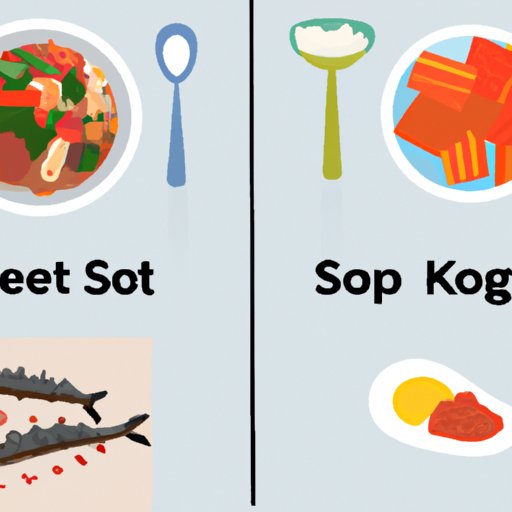Introduction
Korean food is beloved all over the world for its unique flavor and bold spices. From kimchi to bibimbap, these dishes are packed with a variety of healthy ingredients that offer a host of health benefits. But is Korean food actually healthy? In this article, we’ll explore the nutritional benefits and potential risks of traditional Korean cuisine to help you make an informed decision about your diet.
Overview of Korean Cuisine
Korean cuisine is known for its vibrant flavors and bold spices. Common ingredients include fermented vegetables like kimchi, beef, pork, rice, noodles, and various herbs and spices. Korean dishes often feature a combination of sweet, sour, salty, and spicy flavors. The traditional Korean table setting includes numerous side dishes called banchan, which can range from marinated vegetables to spicy seafood.
Exploring the Nutritional Benefits of Korean Cuisine
Korean food is packed with a variety of healthy ingredients that offer a host of nutritional benefits. Commonly used ingredients like garlic, ginger, and chili peppers contain antioxidants and anti-inflammatory properties. Fermented foods like kimchi are also rich in probiotics, which can help improve digestion and boost immunity. Many Korean dishes are cooked with sesame oil, which is high in monounsaturated fats and essential vitamins and minerals.

How Korean Cooking Techniques Enhance Nutritional Value
Korean cooking techniques also enhance the nutritional value of dishes. For example, steaming and boiling are common cooking methods used to preserve the flavor and nutrients of ingredients. Grilling and stir-frying are also popular, as they require minimal use of oils and fats. These cooking techniques help retain the flavor and nutritional benefits of the food while minimizing the risk of unhealthy additives.
Health Benefits of Popular Korean Dishes
Let’s take a look at some of the most popular Korean dishes and their associated health benefits:
Kimchi
Kimchi is a popular Korean dish made from fermented cabbage and a variety of spices. It’s rich in vitamins A, B, and C, as well as calcium and iron. Kimchi also contains probiotics, which can help support gut health. Studies have even shown that kimchi may help prevent certain types of cancer and reduce inflammation.
Bibimbap
Bibimbap is a popular Korean dish that consists of rice, vegetables, and meat. It’s low in calories and rich in vitamins and minerals. The vegetables provide fiber, while the meat provides protein. This dish can be a great source of nutrition if you’re looking for a light meal.
Bulgogi
Bulgogi is a popular Korean dish made from thinly sliced beef marinated in a sweet and savory sauce. It’s rich in protein, as well as vitamins and minerals. Bulgogi also contains healthy fats, which can help reduce cholesterol levels. If you’re looking for a protein-rich meal, bulgogi can be a great option.
Evaluating the Health Risks of Eating Korean Food
While Korean food can be a great way to get essential vitamins and minerals, it’s important to be aware of the potential health risks associated with eating it. One of the main concerns is the high sodium content in many Korean dishes. Salty sauces and pickled vegetables can add significant amounts of sodium to meals, which can increase blood pressure and put strain on the heart.
Another potential issue is allergies. Some traditional Korean dishes contain ingredients like shellfish and peanuts, which can cause serious allergic reactions in some people. It’s important to be aware of any potential allergens before consuming a dish.

Examining the Ingredients in Traditional Korean Food
In addition to evaluating the potential health risks, it’s also important to examine the ingredients used in traditional Korean dishes. Fermented foods like kimchi are a staple in Korean cuisine, and they offer a variety of health benefits. Fermented foods contain probiotics, which can help support digestive health. They also contain beneficial enzymes and vitamins that can help boost immunity.
Spices and herbs are also commonly used in Korean dishes. These ingredients can add flavor and enhance the nutritional value of the food. Common spices used in Korean cuisine include garlic, ginger, and chili peppers, which contain antioxidants and anti-inflammatory properties.

Comparing Korean Cuisine to Other Regional Diets
When it comes to comparing Korean cuisine to other regional diets, there are a few key differences. East Asian cuisines like Chinese, Japanese, and Vietnamese tend to focus heavily on fresh fruits and vegetables, as well as lean proteins like fish and seafood. Western diets, on the other hand, tend to be higher in fat and sugar and lower in fiber.
Overall, Korean cuisine is generally healthier than many other regional diets. While it does contain some unhealthy ingredients, it also features a variety of nutritious foods like vegetables, lean proteins, and fermented foods. The traditional cooking methods also help to preserve the flavor and nutritional value of the ingredients.
Conclusion
In conclusion, Korean food can be a great option for those looking to add more nutritious ingredients to their diet. It’s rich in vitamins and minerals, as well as healthy fats and probiotics. However, it’s important to be aware of the potential health risks associated with eating Korean food, such as the high sodium content and potential allergen issues. Ultimately, it’s up to you to decide what works best for your diet.
(Note: Is this article not meeting your expectations? Do you have knowledge or insights to share? Unlock new opportunities and expand your reach by joining our authors team. Click Registration to join us and share your expertise with our readers.)
